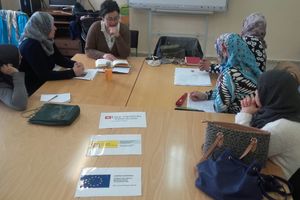PlAy the FraternIty cArd with adUlts as wEll !

In Spring 2018, CIVES foundation carried out Let's Play the Fraternity Card with two groups of adult women of migrant origin who participate weekly in the Integral Network of Alcalá de Henares (RIAH) in Spain. In these groups, women talk about their lives and subjects of their interest, moderated by a social educator and supported by a pedagogue. These two groups did not know each other; we* used this fact to adapt the Fraternity Card activity.
The educators selected five photos, which were presented in A3 size to each group independently during an hour-and-a-half-long session. Participants were given time for spontaneous expression. Then began the analysis, from the environment to the expression of faces and bodies. The second session followed up with the questions: What do you think the photographer want us to feel? What details are relevant to feel that way? Do I agree with my colleagues? Debate arose and was moderated. To finish, we told the story behind each picture, where it had been taken and who the author was.
During the third session, also an hour and a half long, we explained the concept of fraternity. The participants gave examples of gestures of fraternity that they have experienced in their daily lives. Then they were asked if they wanted to participate in the postcard exchange. The Fraternity Card project was explained with an adaptation: the postcards were to be sent to a woman from the other group, or a different group with similar objectives. They decided that they wanted to send a postcard to an unknown woman, but they wanted to make sure that the recipient would understand the message. They chose one each, made a draft in their notebooks and then transcribed it in the chosen postcard, with help when it was needed. The group that received the letters first was very moved, and they all ended up exchanging postcards with each other.
Although the language barrier showed to be a difficulty, the educators managed to overcome it, and this had a positive impact on the participants, who found ways to express themselves. One way to overcome these challenges is to allow for expression in the form of drawing, painting or photography. Each group has its own personality, but the common factor between both is the positive environment which allows for mutual support help such as the exchange of children's clothing, baby carriages or food delivery. It is in these situations that they treat each other as sisters: they already have integrated the idea of fraternity.